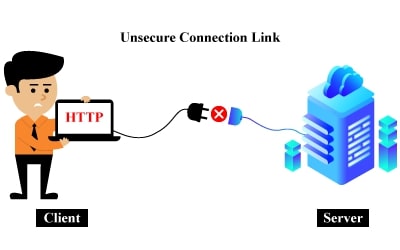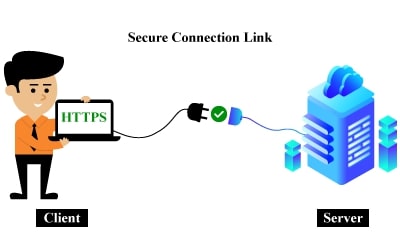Whenever Google gives new priority, the Internet is forced to take notes. A similar situation occurs when Google announces that sites with SSL certificates/HTTPS protocols will be preferred in search engine results. I will try to introduce the basic principles of HTTP and HTTPS protocols.
Before diving into the HTTP and HTTPS protocols, let’s try to understand the meaning of the Web protocol.
Do you know that 68% of Internet users think that the current law does not protect their rights enough?
Contents
What is a Protocol?

The standard Internet network protocol, TCP / IP, stands for Transmission Control Protocol / Internet Protocol. The standard section of the Internet protocol deals with the addressing of data message packets. Other protocols running in the TCP / IP structure include UDP, HTTP, and FTP. Each has different functions and objectives and ultimately provides various functions through the so-called World Wide Web.
Difference Between HTTP and HTTPS
In the address bar of a browser, have you noticed either HTTP:// or https:// at the time of browsing a website? If neither of these is present then most likely, it’s HTTP:// Let’s find
| Parameter | HTTP | HTTPS |
| Protocol | It is hypertext transfer protocol. | It is a hypertext transfer protocol with security. |
| Security | Data is vulnerable to hackers, security is low. | It is designed to prevent hackers from accessing critical information. It can defend against this type of attack. |
| Port | It uses port 80 by default | It uses port 443 by default. |
| Start With | HTTP URLs begin with http:// | HTTPs URLs begin with https:// |
| Used For | It’s perfect for websites designed for information consumption such as blogs. | If the site needs to collect confidential information such as credit card numbers, it is a more secure protocol. |
| Protocol | It operates at the TCP/IP level. | HTTPS does not have a separate protocol. It runs over HTTP but uses a TLS / SSL encrypted connection. |
| Domain Name Validation | HTTP websites do not need SSL. | HTTPS requires SSL certificate. |
| Data encryption | HTTP website doesn’t use encryption. | HTTPS websites use data encryption. |
What is HTTP?

HTTP (Hypertext Transfer Protocol) is the basis of network data communication. This is how the Internet works when it provides web pages. It is a TCP/IP-based protocol that allows you to transfer text, audio, video, images, and more.
HTTP works in the request and response cycle of the client requesting a web page. Suppose, if you browsing on google.com, then you are requesting a web page from the server and the server will respond to you.
HTTP is a stateless protocol, which means that every transaction you make on HTTP is essentially free. However, this can be done using HTTP cookies, server-side sessions, variables, and URL rewrites.
Advantages of HTTP
- HTTP can be implemented through other protocols on the Internet or other networks
- HTTP pages are stored in computer and internet cache so that they can be accessed quickly
- Being independent of the platform allows cross-platform porting
- No runtime support is required
- Available for firewalls! Global applications are possible
- Not Connected-Oriented; Therefore there is no network overhead to create and maintain session state and information
What is HTTPS?

HTTPS (hypertext transmission protocol security) is nothing more than HTTP working with SSL (Secure Socket Layer) in HTTPS, which is a “S”. SSL is confident that the data should be stored safely on the Internet.
The Protocol is designed to increase the Internet primarily when communicating with websites and sending sensitive data. This makes man-in-the-middle attacks more and more difficult because data transmission is no longer plain text.
To protect your website, you must purchase something so-called SSL certificate. These are relatively expensive and most hosting companies offer them. An SSL certificate is similar to an online card. The SSL certificate also encrypts all data transmitted via the HTTPS protocol.
The client now requests data from the server and looks up the SSL certificate used to verify the identity of the site with the certificate. If everything is ok, a handshake will occur, setting the encryption method on SSL.
Advantages of HTTPS
- In most cases, will be redirected to sites running on HTTPS. So even if you type HTTP: //, but it will redirect to HTTPS via a secure connection.
- It allows users to make secure e-commerce transactions such as online banking.
- SSL technology protects any user and creates trust.
- Confirms the identity of the owner of the independent authority certificate. Therefore, each SSL certificate contains unique authentication information about the certificate owner.
Here are some of the features which are now only available on HTTPS
GeoLocation: If you are using HTTP, you can not find the user’s location
- Web push notifications: Push notifications only apply to HTTPS.
- PWA – Progressive Web App: It enables you to convert your website as a Playstore mobile App in Android. PWA / TWA has impressive features
- GetUserMedia: If you are using HTTP, you can not allow the user to use the camera/microphone.
- HTTP//: All major browsers, support HTTP// for HTTPS now.
Does Using HTTPS Improve Search Ranking?

- HTTP does not improve Search Ranking.
- HTTPS helps to Improve Search Ranking.
Why SSL Certificates are Essential For Push Notifications?

SSL is important for push notifications, especially if you do not process credit card numbers or other sensitive data? In short, security. Your users are actually inviting you to your homes, such as if you do not open the door to walk in the physical house for someone, then your website should ensure that any communication with your customers (push notifications) Including) are as safe as possible.
Web push notifications are caused only by the HTTPS protocol used. The data transmitted and received are personal data. For privacy reasons, this is only supported for HTTPS protocols.
Notifications are mostly personal to users. We definitely want this communication to be safe. In this particular case, the server can ping the browser.
NotifyVisitors uses SSL to secure all push notifications sent through the platform. This means you can use NotifyVisitors with full confidence that both you and your push notification recipients are safe.
Get your free trial today!

























 Email
Email SMS
SMS Whatsapp
Whatsapp Web Push
Web Push App Push
App Push Popups
Popups Channel A/B Testing
Channel A/B Testing  Control groups Analysis
Control groups Analysis Frequency Capping
Frequency Capping Funnel Analysis
Funnel Analysis Cohort Analysis
Cohort Analysis RFM Analysis
RFM Analysis Signup Forms
Signup Forms Surveys
Surveys NPS
NPS Landing pages personalization
Landing pages personalization  Website A/B Testing
Website A/B Testing  PWA/TWA
PWA/TWA Heatmaps
Heatmaps Session Recording
Session Recording Wix
Wix Shopify
Shopify Magento
Magento Woocommerce
Woocommerce eCommerce D2C
eCommerce D2C  Mutual Funds
Mutual Funds Insurance
Insurance Lending
Lending  Recipes
Recipes  Product Updates
Product Updates App Marketplace
App Marketplace Academy
Academy

